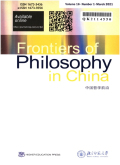Theory of the Unity of Body and Mind from the Perspective of Wang Yangming’s Philosophy of Mind
The relationship between the body and mind is one of the most important topics in Chinese and Western philosophies. Wang Yangming held the view that “body, mind, consciousness, conscience, and things are one piece,” and the five elements are integrated and inseparable, which together form the “true self” of “integration with the world and all things,” namely, the “big self.” The “big self” represents the original field of pre-objectification, pre- cognition, and pre-theorization. In general, “mind” is the induction of the original field; “body” is the manifestation of the original field. However, due to the self-objectification of consciousness, people cling to the “body’s self” and fall into the “small self” separated from others: “body” becomes the physiological basis relative to the mind, consciousness, conscience and things, and “consciousness” becomes the psychological activity relative to the body, mind, conscience and things, so there is a relationship of “non-uniformity and non- difference” between body and consciousness. Wang Yangming’s discussion of body and mind is not focused on the feeling and cognition under the interaction of physiology and psychology at the level of “small self,” but on returning to the original “big self” to realize the settlement of life, involving cosmology, ontology, and other broader perspectives. In this regard, it is possible for Chinese and Western philosophies to learn from each other in the discussion of the body and mind.
Yangming’s philosophy of mind、 body-mind、 the big self、 the small self、 morality practice Western philosophy leaves b
19
2024-09-26(万方平台首次上网日期,不代表论文的发表时间)
共16页
177-192





